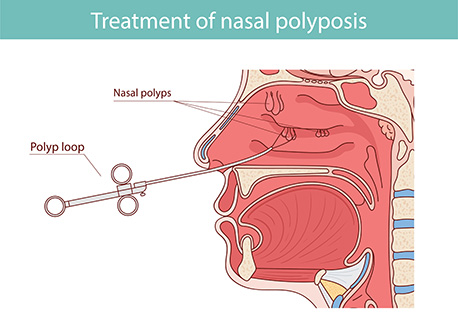Dr Chin Explores Nasal polyps: Learn the facts, avoid the risks, and take control
Learn the facts, avoid the risks, and take control
Nasal polyps are soft growths in the nasal cavity that can cause chronic sinusitis, blocked airways, and sinus infections. Common symptoms include difficulty breathing, loss of smell, and nasal passage swelling. Understanding the condition, its signs, and causes is crucial. Treatment options include non-surgical methods, nasal corticosteroids, natural remedies, or endoscopic sinus surgery. Patients and doctors should collaborate to manage polyps and prevent their return.
What Are Nasal Polyps?
Nasal polyps grow in the lining of the nasal passages or sinuses. These polyps are often linked to long-lasting inflammation. Conditions such as chronic rhinosinusitis, allergies, or asthma can lead to these growths. Usually, they do not cause pain, but they can interfere with how your nose functions and lower your overall quality of life.
Common Symptoms of Nasal Polyps
Many people may not realise they have nasal polyps until their symptoms become more serious.
Key symptoms of nasal polyps include:
- A nasal obstruction or a constant feeling of being stuffed up
- Difficulty breathing through the nose, mainly at night
- A loss of smell or reduced ability to taste
- Postnasal drip and a feeling of pressure in the face
- Frequent sinus infections
Causes and Risk Factors
Understanding why nasal polyps occur is important for preventing and managing them. They mostly develop due to long-term inflammation in the nasal cavity. This inflammation is often found in:
- Chronic rhinosinusitis
- Asthma
- Aspirin-exacerbated respiratory disease (AERD)
- Allergic fungal sinusitis
Other factors that can increase the risk of nasal polyps are having a family history of polyps, being sensitive to NSAIDs, and suffering from immune disorders.
Diagnosis and Evaluation
To diagnose nasal polyps, an ENT specialist typically conducts a thorough examination using nasal endoscopy, which allows direct visualization of the polyps. Imaging tests, such as a CT scan, may be used to assess the extent of the polyps and identify any sinus issues. Allergy testing can help determine if allergies are contributing to the condition. In some cases, further tests may be necessary to rule out other underlying conditions like asthma or chronic rhinosinusitis.
Treatment Options
Here are the most common and effective treatment options for managing nasal polyps:
- Nasal corticosteroid sprays: First-line treatment to reduce inflammation and shrink polyps.
- Oral/injectable steroids: Used for severe or persistent cases.
- Saline rinses: Clear mucus and reduce irritation.
- Antihistamines: Help if allergies are a factor.
- Antibiotics: Used for bacterial sinus infections.
- Biologics: Target inflammation in asthma-related cases.
- Natural remedies: Supportive care like steam or diet changes.
- Endoscopic sinus surgery: Removes polyps when medications fail.
- Long-term management: Prevents recurrence with regular care and trigger control.
Managing and Preventing Recurrence
Controlling underlying conditions like asthma, allergies, and chronic sinusitis is key to preventing nasal polyp recurrence. Daily use of nasal corticosteroids, avoiding triggers, and maintaining nasal hygiene with saline rinses help reduce inflammation. Regular follow-ups with an ENT specialist ensure early intervention if symptoms return. In persistent cases, long-term therapies such as biologics may be needed for ongoing management.








